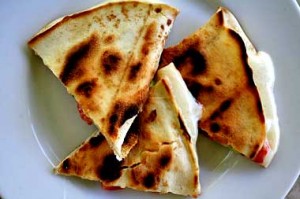Let me give a quick thanks to Cousin #3 for her comment on my post “Cousin #1.” She clarifies an error I made and also makes some great points about the importance of societal priorities… and how they’re often fucked up.
But since we’re on the subject of family, now is a good time to introduce you to the grandmother.
Three-quarters of my grandparents died before I was born or so early in my life that I have virtually no recollection of them. So my only real experience with grandparents is my maternal abuela.
I met my grandmother when I was eleven, when she moved to this country against her will. All through my adolescence and early adulthood, she rarely passed on an opportunity to remind everyone that she had never wanted to come to the United States and that it was her troublesome daughters who had brought her to this frigid nation.
She is now pushing ninety, and she has lived in America for almost one-third of her life. Her birthday is October 31 (Halloween), and when she discovered that American kids dress up like ghosts and demons and devils on that day, she took it personally.
Despite her advanced age, she is absurdly healthy, leading my family to the conclusion that we have good genes and tend to live a long time if nobody shoots us. It’s true that she limps more noticeably because of a hip injury from decades past. But even with this mild handicap, helping her down the stairs is pointless, as she is likely to slap away the hand of someone trying to guide her. It’s a bit of a metaphor.
Her stubbornness is legendary and shows up at predictable moments. For example, it isn’t really a family Christmas until she throws a fit. Each year, she denounces the food as inedible, even if a separate dish has been made solely for her and is something that she consumes every other day of the year (usually dark-meat chicken). Then she goes to sit by herself on the couch while everyone else eats and drinks and laughs. The first few holidays that she pulled this, one of the cousins or someone brimming with Christmas spirit would try to cheer her up. By now, however, we barely notice when she limps off in peevishness. It is tradition, and it usually means that we can open the presents soon.
Food has also been the source of a few run-ins that I’ve had with her. When she came to America, she brought her old-world ways with her, which included a belief that men can’t – and more importantly, shouldn’t – ever cook. My mother tried to explain to her that things were different in America and, as a single mom, she needed me to step up and occasionally prepare my own meals. This scandalized my grandmother, who dismissed the whole argument of men in the kitchen with a curt “Sin verguenza.”
And yes, if you take her out to dinner, she will complain that the food is cooked specifically to kill her.
Her drive to be judgmental is, in culinary matters at least, somewhat justified. She makes magnificent pupusas, which are a Salvadoran delicacy so amazing that I feel physically sorry for anyone who has not had them.
Making pupusas are a link to her previous life in El Salvador. However, asking her about this former life doesn’t reveal fascinating insights about another culture or a deeper look at our family tree.
Instead, it usually just provokes her to spit out some fact about the area and follow it up with a list of townspeople whom she hated or are probably dead. Then she waves her bony hands and declares the conversation finished.
Indeed, when she visited her homeland for the first time in decades, she summarized the trip with a shrug and the condemnation that everyone in El Salvador had become morbidly obese.
She has outlived two of her children and all of the men in her life. As one family member has stated, “You’re supposed to live long enough to annoy your children. But she’s lived long enough to annoy her grandchildren.” Actually, she is now a great-grandmother, so perhaps she will let a third generation know exactly what she thinks of it.
Despite her perpetual grumpiness, my grandmother did have one moment of moral clarity and bold defiance. That moment, however, deserves a post of its own, so I will address it in the future.
Instead, let me relate the fact that about twenty years after being dragged into America kicking and screaming, my grandmother learned that the war in El Salvador was over and that she could safely go home to live out her remaining years. My mother and aunt told her the news with the expectation that my abuela would be thrilled to return.
But my grandmother looked them right in the eye and said she didn’t have the slightest idea what they were talking about. America was her home, and she had no intention of returning to a sweltering land with dirt roads. She denied ever denigrating the United States, and she said it was crazy to think that she would ever want to leave.
“Por que?” she said, and returned to cooking her pupusas.






